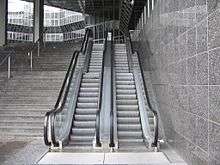escalator
English

Escalators
Escalators
Etymology
From Escalator created by American inventor Charles Seeberger in 1900, from Latin e (“from", "out of”) + scala (“ladder”) + -or, which forms nouns of agency. Formerly a trademark. See: the appendix. Broader usage may be influenced by escalate. For an alternative etymology, see Online Etymology Dictionary.
Pronunciation
Noun
escalator (plural escalators)
- A motor-driven mechanical device consisting of a continuous loop of steps that automatically conveys people from one floor to another.
- An upward or progressive course.
- 2009 February 19, Froma Harrop, “Housing aid may revive American dream for Latinos”, in Houston Chronicle:
- Lots of people fell for the pitch that real estate was an up-only escalator into the American Dream
-
- An escalator clause.
- They agreed to a cost-of-living escalator.
Derived terms
Related terms
Translations
mechanical device
|
|
See also


- movator
- moving pavement, moving sidewalk
- moving ramp
- moving walkway
- stairway
- step
- travelator
French
Pronunciation
- IPA(key): /ɛs.ka.la.tɔʁ/
Etymology
Borrowed from English. Genericized trademark.
This article is issued from
Wiktionary.
The text is licensed under Creative
Commons - Attribution - Sharealike.
Additional terms may apply for the media files.